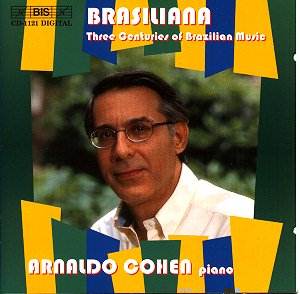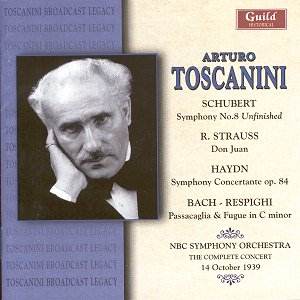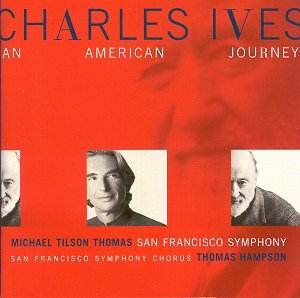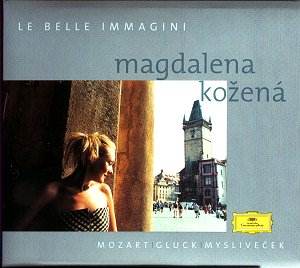 Composer: Various
Composer: Various
Works: Cláudio Santoro – Paulistana no 4; Paulistana no 1; Mozart Camargo Guarnieri – Dança Negra; Ponteio no 49; Henrique Oswald – Il neige; Francisco Mignone – Valse de Esquina no 1; Corrupio; Luiz Levy – Valsa Lenta no 4; César Guerra Peixe – Prelúdio Tropical no 2; Eduardo Dutra – Prelude in f sharp minor Op32; Octavio Pinto – March, little soldier!; Sleeping time; Leopoldo Miguez – Peça no 3; Peça no 8; Luiz Álvares Pinto – No 24 in a minor; No 21 in d minor; Francisco (Chiquinha) Gonzaga – Gaúcho – Tango Brasileiro; Alberto Nepomuceno – Air (from Suite Antiga); José Mauricio Nunes Garcia – Fantasia para Pianoforte no 4; Heitor Villa-Lobos – O Polichinello; Valsa da Dor; Radames Gnattali – Valsa no 7; José Siqueira – Valsa no 3; Ernesto Nazareth – Apanhei-te, Cavaquinho; Odeon – Tango Brasiliero; Oscar Lorenzo Fernandez – Suite Brasiliera no 2; Ponteio; Moda; Cateretê; Arnaldo Cohen – piano
Recording: Made in the former Academy of Music, Stockholm, June 2000
Label: BIS
The disc “BRASILIANA: Three Centuries Of Brazilian Music” offers a remarkable survey of Brazil’s rich piano repertoire, deftly showcasing the evolution and diversity of its musical heritage over three centuries. The project is ambitious, featuring an array of composers spanning from the Baroque to contemporary periods, and it serves as an essential reminder of Brazil’s unique position in the global music narrative, often overshadowed by its European counterparts. The inclusion of composers such as Cláudio Santoro and Heitor Villa-Lobos highlights how Brazilian music is both an echo of European traditions and a vibrant entity in its own right.
Arnaldo Cohen’s performance is a compelling mix of technical brilliance and artistic expressiveness. His interpretation of Santoro’s “Paulistana no 4” bursts forth with the exuberance akin to a Brazilian carnival, setting a lively tone for the album. Cohen’s ability to navigate the rhythmic complexities and vibrant colors of the music is commendable, especially in works like Ernesto Nazareth’s “Odeon,” where he captures the essence of Brazilian popular music with nuanced phrasing and infectious energy. However, in dealing with earlier works, such as those by Luiz Álvares Pinto and José Mauricio Nunes Garcia, Cohen occasionally struggles to imbue them with the same vitality, leading to performances that, while technically proficient, may lack the interpretive depth that the repertoire demands.
The recording quality of BIS is exemplary, with clarity that allows each note to resonate with distinctiveness. The engineering captures the full spectrum of the piano’s timbre, enabling listeners to appreciate the subtleties of Cohen’s touch and dynamics. The short duration of most tracks—often under five minutes—might suggest a casual listening experience, yet the cumulative effect is one of engaging diversity that holds attention throughout the disc.
Cohen’s interpretative choices often reflect a keen understanding of the cultural contexts from which these works emerge. His phrasing in Guarnieri’s “Dança Negra” conveys a rhythmic vitality that evokes the dance’s origins, while his handling of Mignone’s “Valse de Esquina no 1” balances lightness and sophistication. Yet, one cannot help but find a contrast when comparing this collection with the more robust recordings of Villa-Lobos’ works by other pianists, such as Nelson Freire, whose interpretations tend to delve deeper into the emotional core of the music.
The rich tapestry of Brazilian music encompassed in this collection offers listeners both a historical overview and an insight into the country’s vibrant musical language. Arnaldo Cohen’s performance, while occasionally uneven, succeeds in illuminating the joys and complexities of this repertoire, making it a valuable addition to the catalog of Brazilian piano music. This disc not only serves as an excellent introduction to the breadth of Brazilian piano compositions but also as a celebration of the country’s cultural richness.



